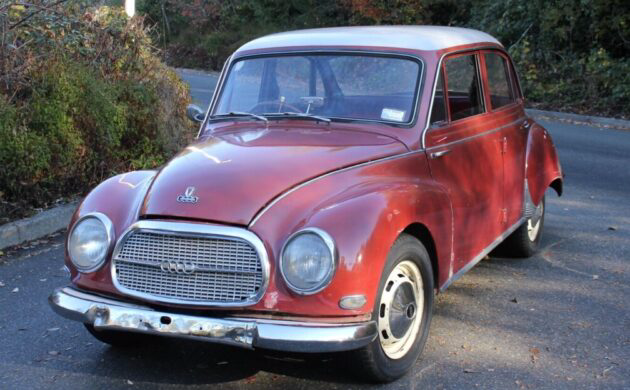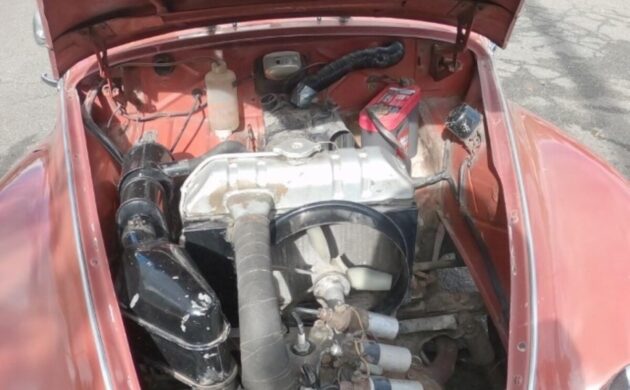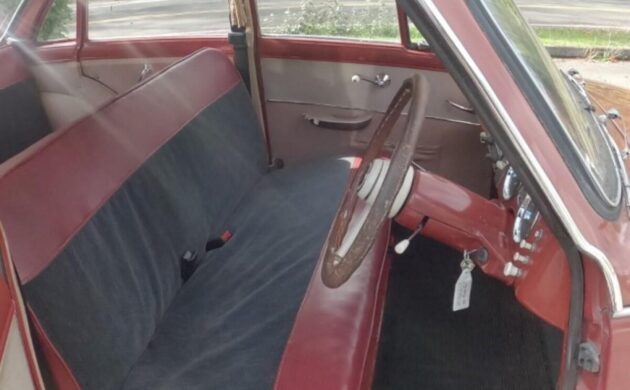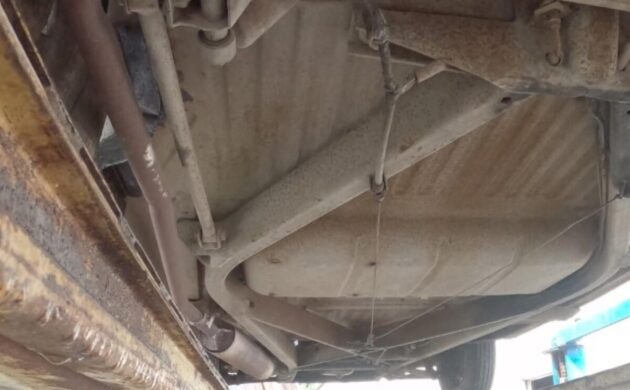Auto Union was formed in the 1930s from the combination of four companies – Audi, Horch, DKW, and Wanderer. After WWII, only the DKW nameplate survived; the other brands were shelved until better times arrived. The company competed with Volkswagen, another maker of economical cars, but thanks to a stunted design budget, DKW began losing market share. It had barely innovated its post-war car, the F89, and when it came time to refresh that model, only a few tweaks turned it into the DKW 3=6. The basic platform stretched back some two decades. So in 1958, the company created a break with the past. It increased the displacement of the 3=6 engine and badged the new car with the Auto Union nameplate. This was the Auto Union 1000, offered in three body styles: a wagon, a coupe, and a sedan. Here on eBay is a 1959 Auto Union 1000 sedan, bid to $3450 with a buy-it-now at $5995. The car is offered by Cosmopolitan Motors, located in Seattle, Washington. The seller advises that if its new garage is many miles away, it probably ought to go home on a trailer. Kyle K submitted this excellent tip – thanks, Kyle!
Powered by a spritely water-cooled three-cylinder two-stroke displacing 981 cc’s, the little car could reach a top speed of about 80 mph. To get there, the driver rowed through four gears on the column-shift manual. Only seven parts in the motor move: three pistons, three con rods, and the crank. The car is equipped with a radiator blind to facilitate cold starts; the fan acts to warm the cabin as well as to dissipate heat from the engine bay. So competent was the 1000 that it raced successfully all over the world, gathering wins at rallies including the Acropolis, Monte Carlo, and the South African Nationals. This example was found in the airplane hangar of a Czech mechanic working in Bend, Oregon, and it runs and drives.
The car was imported to the US from South Africa so it is right-hand drive. The interior is said to be substantially original. It’s certainly in excellent condition given the car’s vintage. Photos show every door panel – not even the elasticized map pockets sag. The rear seats are pristine.
The underside is clean and dry, showing no collision damage, nor barely any surface rust. The car’s body does have a ding or a dent in just about every corner, and the paint is not perfect. The front bumper needs straightening. But overall, the gently aged quality of everything is charming, just about as charming as the car’s “face”. And the price is right for an unusual vintage car that will draw admirers at any show, even as it is. I’ll be shocked if this one doesn’t find a buyer.






There is a man, a certain man,,in my little town that is a business owner of some sort, and has an eclectic collection of vehicles. To name a few, a ’66 Bug, a mid 60s Land Rover with aluminum(?) body, another Land Rover, and a DKW 1000 just like this, only left drive. All in pristine condition, and all with Minnesota collector plates. Naturally this car caught my attention, and I bet very few know it has any connection with Audi. One thing though, I haven’t been able to track the person down, but it has a chrome lightning bolt on the front fender, indicating it may be an electric conversion.
I have to chuckle, 3=6,,yeah, no 6 cylinders I know of. Let’s see, the smallest in-line 6 I can think of, is Fords 144, and as gutless as it was, still way more than this. Application is the key, I suppose.
Couple things that would make me wake up screaming, the right hand drive, the ring ding motor,,sorry dear, 80 mph off the Cliffs of Dover, maybe 50 hammer down and looks as if you’d freeze your touchas off, if that’s an issue. Next time I see the one in town, I’m going to ask around. If it is electric, I wonder how that worked out? Sorry, 2 strokes were okay for dirt bikes, boat motors and diesel rigs, but fell short for passenger cars, in this here country anyway. Repowered with a PLAUSIBLE swap, it could be a fun car .
There is a 6 sylinder version, a skunkworks edition developed with factory support in about 100 units by Hans Müller. It is a V6 of 1280cc which gives 85 bhp via twin carbs. It screams like noithing else.
There is one example up and running in Madrid with 1000SP coupé bodywork, check out: https://www.autopista.es/clasicos/auto-union-1000-sp-v6-6-12-una-obra-en-dos-tiempos_134078_102.html
You may need Google translate
3 cyl 2 stroke? Is that the idea premise for the Saab Sonnett? Regardless, with no engine compression to slow with (unless you’ve a compression release) the brakes would have to be substantial IMO.
Good subject matter, Michelle. Haven’t seen a DKW here for awhile.
The Saab Sonnet was designed by a DKW engineer directly after the war. DKW´s (cars and motorcycles) were exceedingly popular in Scandinavian countries due to the 2-strokes easy driveability in sub zero climates and their front-wheel drive, an anomaly in those days. The DKW was a very lively car and built to Mercedes standards. Its demise was due to a relentless anti 2-stroke campaign in Germany (the Germans like to cut their own throats by demonizing their achievements, the demise of their world leading 2-stroke industries cost tens of thousands of well paid jobs.Today they junked their fabulous atomic power plants, making them reliant on electricity imports and thereby subject to extortion by less than friendly France, not to forget their insane reliance on oil and natural gas from the USA , their occupier).. This car would be a gas to drive in restored condition.
This was actually slightly upmarket from the VW and competed with conventionally-engineered 1500cc cars (mainly, in Germany, the Opel Rekord and Ford Taunus). DKW had the “Junior” model starting in 1959 at the VW’s price – a smaller car and engine, but with comparable performance and then-modern standards of styling and space utilization.
I believe the smaller “Junior” model was called the “Lloyd”. IIRC, the DKW coupes were “hardtops” (no B-pillar) and were really quite attractive. Correct me if I’m wrong.
The Lloyd was part of the Hansa-Lloyd Borgward organization, not DKW or Auto Union.
The Lloyd was part of the Borgward group and had no relationship with DKW. As far DKW´s having been attractive, you are correct. The DKW-AUTO UNION 1000 Sp 2 PLUS 2.seater –
The Lloyd was in the Borgward’s stable.
No, they looked a little like hardtops, but a bit more research has revealed the B-pillar. My bad…
Allen
Allen, first of all, there were DKW Hardtop Coupes – even back when they had suicide doors. They also did some rare convertibles, I have seen one and it was just stunning.
Secondly, Lloyd had no connection at all to DKW. Lloyd was part of the Borgward group and was built up in Bremen.
As for how DKW morphed into Audi, well, in the early 60’s these cars were decidedly old fashioned, both in design, and technology. DKW then designed the new F102 which was a fully modern looking car- but still saddled with the old two stroke engine. Mercedes owned DKW at this time and stepped in designing a modern 4 stroke engine for the F102, but to mark the difference it was given a new brand name Audi. Funny enough, no one had seemingly thought about giving it any model name so in the beginning it had no other name than just The Audi.
The irony is that Daimler designed 4-stroke would become the basis for VW and Audi when VW needed to move away from air cooled engines.
Saw a convertible at Essen, Techno-Classica, recently.
How many hundreds of photos did you take, Michelle? I’m like a bairn in a sweetshop whenever I go to Retromobile.
Surprisingly not that many! There is a balance between living behind the camera and really seeing what you came to see. I do have plenty of photos of race cars with spectacular histories, nearly all Italian. Those probably need to go on Veloce Today.
Take this to an Audi dealer for service and watch them recoil in horror as they come face to face with their frumpy past.
And see how many of their techs can figure out where the 3 points and condensers are located, and how to gap them. ;)
Mike, you appear to have serious emotional issues. This is a site for automotive enthusiasts, not for mental cases.
This car was featured on another totally commercialized, no soul, no ethics anymore well known auction site, Bring-A-Taylor or something like that and once the identity and reputation of the seller became known, the auction pretty much and deservedly so, tanked. Run the other way, don’t merely walk, whenever you see offerings from this seller!
I once bought one of these, which was less than 2 years old and had a bad engine bearing, for $200.00. I was told the engine was not repairable but my dad took it apart, had a machine shop press on a new bearing and it then ran well! Very nice little car but yes, Audi is probably somewhat ashamed of their past!
—— another merntal case? Audi goes back to 1911, founded by August Horch and has never in its entire history done anything to be ashamed about. What the hell is wrong with you people?
Jerry! Take a deep breath.
It’s nothing to go to war over.
Jerry! Take a deap breath.
Nothing here to go to war over.
No, no, let him rant, it takes a lot of pressure off of me,,I think “mental case” is a bit strong. I DO believe a modern Audi mechanic would run screaming into the night, and considering where Audi went, I DO believe they are ashamed of this car, not unlike Honda and the 600 or Subaru and the 360. Not many care about humble beginnings anymore. THAT’s your mental cases.
Jim Clark’s first racing car was a DKW.
Regarding SAAB, the original 1950 SAAB 92 sedan was designed by SAAB engineers with the DKW concept as a guide, as DKW had been popular in Sweden before the war. Part of the idea behind the 92 was to keep SAAB (Swedish Airplane Company) employees working when aircraft demand eased after the war.
The SAAB 92 2-cylinder 2-stroke sedan was developed into the 3-cylinder 93 in the 1950s, and finally the 96, manufactured from 1960-1980. The 96 first came with 2-stroke engines, and later with German Ford V4 4-stroke engines.
The Saab Sonett (spelling is correct) was an experimental sports convertible designed in the 1950s. Just a few examples were built. The Sonett II/Sonett V4 was a production fiberglass coupe, first with the 2-stroke engine, then with the V4, made from the 1967-1969 model years. These were followed by the restyled Sonett III, made from 1970-74, also with the V4, 4-stroke engine.
Mercedes-Benz did design the 4-stroke engine used to transform the DKW F-102 into a marketable car bearing the reborn Audi nameplate. Mercedes sold Auto Union to Volkswagen, which produced and successfully sold the new Audi. VW took over NSU at about the same time to gain factory space and some engineering technology.
And yes, the German manufacturers have some things to be ashamed of. Auto Union, BMW and Mercedes all worked in support of the murderous, authoritarian Nazi regime. Not that they had much choice, but they provided equipment and engineering expertise. The nascent VW, formed by Hitler, of course did the same. It’s clear that there was also considerable use of slave labor by some major German companies during WW2.
The world has largely forgiven them, as their presence around the globe today reflects.
The DKW had a great reputation for quality and performance. But there was no “campagin” against 2-strokes more powerful than buyers’ choices. Drivers ultimately became tired of 2-stroke-powered cars. They stopped buying them. The modern DKW F-102 failed in the marketplace, at the same time that SAAB sales were tanking in Sweden and the US, the company’s two major markets. The 4-stroke Audi and the SAAB V4 salvaged the companies’ prospects, although SAAB later failed for other reasons.
This Auto Union 1000 is interesting, notwithstanding its BaT auction history. A local buyer who’s able to inspect it personally could fix whatever needs fixing and have a very enjoyable car.
After the war, the DKW factory was located in the GDR.
Those cars were called IFA, later Wartburg.
The 998cc two-stroke engine already developed 50 horsepower 50 years ago, which was a lot at the time. That engine was indestructible, only the clutch wore out quickly. But replacing it with a plate from a VW beetle solved this problem!
With the unification of Germany, the two-stroke engine was banned. Too bad, because the Wartburg was the cheapest car on the market.
The last real DKW was the F 102; the Lloyd in the DKW Junior section was the Lloyd Arabella / which I drove for years ).
” Audi ” ceased to exist in 1940 – the Audi works only sold 0,2 % of the four makes DKW, Wanderer, Horch and Audi. Hence the name Auto – Union. War production necessities put a ” stop ” to Audi – production…hardly anybody bought them, anyway. Just the Horch for Top – Nazis…
What is called ” Audi ” now is just an upgraded Volkswagen, nothing else. I would prefer the good old DKW all day long. Maybe – as an RHD – car – it might be more difficult to sell, but basicly, it seems to be a very good car, go for it !
My understanding of history is the other way: The sail by Daimler-Benze of Audi and the Auto-Union remnants, coinciding with their merger/acquisition of NSU as it was failing…was the basis for the modern VAG. Volkswagenwerk, not yet struggling around 1970, but seeing its backbone, the Type 1, losing appeal…didn’t know where to go.
The Type 4 had failed. Obviously the rear-engine/air-cooling design didn’t scale upward well. They had no ideas – they played around with a CKD truck kit for Third World countries, air-cooled engine in FRONT with FWD (like they later did with the Fox/Gol in Brazil. Their idea for an SUV, to fight the rising popularity of the Land Cruiser and Jeep products…was to resurrect the Kubelwagen.
NSU and Auto-Union apparently took over the company from within – what with the death of Heinz Nordhoff. We see it, not only in basic design – water-cooled engines, originating with Audi, from the Daimler engineers – but in their approach. No longer would they make a car that was inexpensive to buy and long-lived. Their new offerings were like other European cars – thin sheet metal, attractive, trendy styling, and expensive service needs. Because as one VAG official said, haughtily…the customer should just buy another car when he’s finished paying for the one he has.
Without giving away my age, we, I say we, my father,mother,three kids with camping gear drove all over Europe in the 1950’s in the DKW. It was a robust little sedan and I still have many fond memories. We did feel envious when a big Chevy showed up in the rear vision mirror though!
While these are nothing like today’s Audi models for stockbrokers…change is one thing that’s constant. This one would no more appear in an Audi dealership than a Type 1 would appear today at the VW agency. Both would be foreign to today’s mechanics, either brand, or their sales staff..
That’s how far we’ve come. And how things have molded and merged. It happens everywhere…who would have thought that Willys-Overland would be owned by the descendants of Walter Chrysler’s upstart company; or that both would have changed hands to be owned by what used to be called Peugeot?
Or, Ford. Remember the Swinging Sixties and Ford? We forget, it was a scant 30 years earlier that Old Henry was reluctantly giving assent to change in design of product. The Model T lasted thirty years, and then the A, six.
For that matter, Fords first car company, taken from his control by creditors and investors, continued in operation – and became the basis for General Motors, as the Cadillac division.
Change is always upon us. Some changes are good – the 1980s bumper-car era, with choked engines, ended none-too-soon. Our current problems, too, will probably be wonderment for the next generation.
I’ve owned quite a few DKW and very late DKW/Auto Union cars, including a 3=6 2-door, a SP1000 Bauer coupe [sort of looks like a ’57 T-bird] and a DKW Munga 4X4 German military “Jeep”. I used to own the DKW factory cut-away of the engine/gearbox/diff now in Jeff Lane’s car museum in Nashville, TN.
The 3=6 is based on the concept that the 1000 cc engine size, in a 2-stroke situation, was equal in power output to a 1000 cc 4-stroke 6-cylinder engine. As the DKW was a 2-stroke 3 cylinder engine with each cylinder firing on each crank revolution, it was said to be equal to a 6 cylinder 4-cycle engine because each cylinder fired on every other revolution.
The first SAAB 2-stroke engine was not just a COPY of the small DKW engine, it was actually based on a license from DKW to manufacture the drive train for the new SAAB.